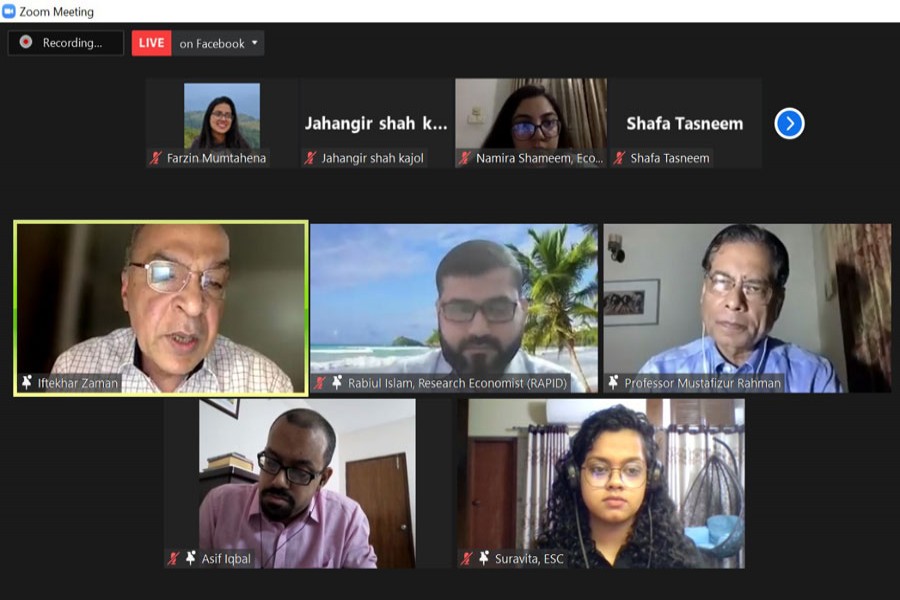Speakers at a programme stressed the need for global collaboration, usage of digital platforms and automatic exchange of information for an inclusive growth.
They came up with this observation at the third episode of People’s Debate titled "Offshore Wealth of Developing Countries: Impediment Towards Inclusive Growth" held virtually on Wednesday.
Economics Study Center, University of Dhaka, and The EMK Center have been organising People’s Debate since 2019 as a platform to exercise freedom of speech on pertinent socioeconomic issues.
Professionals gathered to discuss the issue of capital flight, offshoring the wealth of developing nations, tax evasion, and the impediments it imposes on attaining inclusive development in such nations.
The Financial Express, country's leading business daily, was the media partner of the event.
The session was moderated by Rabiul Islam, research economist of RAPID Bangladesh. The panelists of this session were Dr Iftekharuzzaman, executive director, Transparency International Bangladesh (TiB), Dr Mustafizur Rahman, distinguished fellow of Centre for Policy Dialogue (CPD), and Asif Iqbal, joint director of Bangladesh Bank, according to a statement.
The discussion started with Dr Mustafizur Rahman addressing the fact that a large proportion of our GDP is slipping away due to offshoring, which negatively affects our health and education systems. According to the Global Financial Integrity report, the amount in Bangladesh is about 9.0 billion dollars each year. These types of corruption and tax evasion are increasing wealth, asset and income inequality which eventually create social tension. Dr Rahman aid that these problems mask the good governance of a country. He also stated that a small group of money-grubbing people are taking advantage of the situation, and being linked with political leaders, they remain unaccountable. In the absence of a business-friendly environment, entrepreneurs and investors find it lucrative to invest in offshore business even if it comes with risks. He also said that pressure from the civil society is there which could be beneficial to reduce terrorism, trafficking and inherent anomalies. Global collaboration, law enforcement, increase the amount of forensic investigation of money-laundering, usage of digital platforms and automatic exchange of information can be helpful towards an inclusive society.
Dr Iftekharuzzaman mentioned how frequently illicit transfers are happening in the developed and developing countries. Even in many states of the United States, a 0-per cent tax rate is seen which induces people to invest in these states and provoke offshore businesses. He stated that many expatriates take money outside of the country illegally and at least $2.0 billion are going away this way each year. He stressed the importance of creating public views against the illicit transfer, and that accountability, transparency, and empathy are necessary elements among public leaders to address and reduce this illicit practice. During the discussion, Dr Iftekharuzzaman stated that although the process of retrieving the money is not going to be an easy task for our government, it is not impossible to do so.
Mr Asif Iqbal brought up the issue of data integrity and the inherent dominance of public sector authorities over the private sector. There is a tendency of neglecting private sector data which makes it unreliable to address any issue. A collaborative approach from public bodies, such as Bangladesh Bureau of Statistics (BBS) or National Board of Revenue (NBR), and the private sector would be helpful to identify loopholes of the corrupted system, and provide the policymakers with sufficient data for better policies. It is important to make the public institutions more dynamic and stronger with time. He suggested that a global approach from any international organisation such as the UN, could be conducive for better reduction of these activities.


